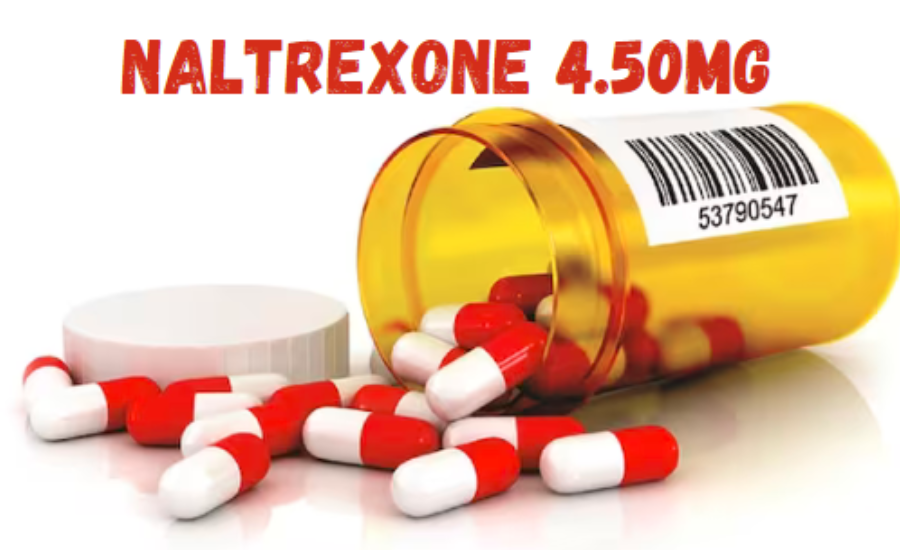Understanding Naltrexone 4.50mg: Uses, Side Effects, And Future Outlook
Naltrexone 4.50mg is a medication widely recognized for aiding in the management of alcohol and opioid dependence. It operates by blocking the pleasurable effects that these substances typically produce, thus supporting individuals in their recovery journey. Like all medications, it’s essential to be aware of the potential side effects associated with naltrexone 4.50mg.
As you begin taking naltrexone 4.50mg, some changes in how you feel may occur. Common reactions include mild nausea or headaches, which usually subside as your body adjusts to the medication. Understanding these effects ahead of time can help you feel more prepared, and it’s always advisable to discuss any concerns with your healthcare provider.
Understanding Naltrexone 4.50mg And Its Functionality
Naltrexone 4.50mg is a medication specifically designed to assist individuals in overcoming alcohol or opioid dependency. It functions by blocking the rewarding sensations that these substances typically produce. By taking Naltrexone 4.50mg, the usual pleasurable effects of alcohol and drugs are diminished, making it easier for individuals to resist cravings and stay on the path to recovery.
This medication is frequently incorporated into treatment plans aimed at maintaining sobriety. It’s crucial to follow your healthcare provider’s directions closely when taking Naltrexone 4.50mg to ensure it’s effective and supports your recovery goals. For many, this medication becomes a vital part of their strategy to achieve long-term health and wellness.
If you’re considering Naltrexone 4.50mg for yourself or a loved one, gaining a thorough understanding of how it works can provide clarity and confidence during the recovery process.
Why Does Naltrexone 4.50mg Sometimes Cause Severe Fatigue?

Naltrexone 4.50mg is prescribed to help manage alcohol dependence and opioid addiction by blocking opioid receptors in the brain. This action reduces cravings and minimizes withdrawal symptoms linked to substance use.
For some individuals, a common but concerning side effect is extreme tiredness. This fatigue may be linked to how Naltrexone interacts with the body’s neurochemistry. Since every person’s body responds differently to medication, the level of tiredness can vary widely among users.
In certain instances, this pronounced exhaustion might also be influenced by other health conditions or medications being taken alongside Naltrexone. Keeping track of these factors is important when assessing how you feel during treatment.
Understanding that fatigue could stem from using Naltrexone allows for better decision-making about your ongoing treatment and health goals.
Common Side Effects Of Naltrexone 4.50mg
When first starting Naltrexone 4.50mg, some individuals may experience side effects. These effects are typically mild and tend to diminish as the body adjusts. Common side effects include nausea, headaches, and feelings of fatigue.
These reactions often occur because your body is getting accustomed to the medication. If you feel nauseous after taking Naltrexone 4.50mg, taking it with food can help ease stomach discomfort. Staying well-hydrated is also beneficial for reducing headaches.
If side effects persist or become bothersome, it’s important to consult your doctor. They can provide guidance on managing these symptoms and ensure that Naltrexone 4.50mg is still effective in your treatment plan.
Tips For Managing Naltrexone 4.50mg Side Effects
Effectively managing side effects can make your experience with Naltrexone 4.50mg more comfortable. To help reduce nausea, taking the medication with a meal is recommended. This can help minimize any stomach upset.
Staying hydrated is another key strategy. Drinking plenty of water can alleviate headaches and reduce dizziness. If fatigue is an issue, incorporating light activities like walking can help boost energy levels.
It can also be useful to track your symptoms in a daily journal. Recording how you feel each day allows you and your healthcare provider to monitor your progress and make any necessary adjustments.
Is Naltrexone 4.50mg The Right Choice For You?

Deciding whether Naltrexone 4.50mg is the right option for you is an important step in your recovery process. While it offers significant benefits to many, it’s essential to determine if it’s the right fit for your specific needs. Discussing your health history and any current medications with your doctor is crucial to ensuring this treatment is both safe and effective for you.
Before starting Naltrexone, your healthcare provider will likely evaluate your overall health and review any medical conditions you may have. This helps identify if this medication is suitable for your situation, as some conditions may require alternative approaches.
If you’re considering Naltrexone as part of your recovery plan, having a thorough discussion with your doctor is a wise step. Together, you can explore whether this medication aligns with your goals and how it can be integrated into your journey toward better health.
How Naltrexone 4.50mg Is Used?
Naltrexone 4.50mg is primarily prescribed to help individuals battling alcohol dependence. By blocking the brain’s response to alcohol’s pleasurable effects, it helps reduce cravings and supports sobriety efforts.
Additionally, this medication is highly beneficial for those recovering from opioid addiction. It works by preventing the “high” typically associated with opioid use, making it easier to avoid relapse.
Beyond its role in treating addiction, Naltrexone has also been explored for its potential in addressing behavioral issues related to food cravings and weight management. Emerging research suggests it might help with controlling appetite and reducing binge-eating episodes.
For many individuals, including Naltrexone in their treatment plan is a critical step toward reclaiming control over their lives. Its diverse applications make it an essential tool in various therapeutic settings.
Understanding The Side Effects Of Naltrexone 4.50mg
Before starting Naltrexone 4.50mg, it’s important to be aware of possible side effects. One common issue reported by users is intense fatigue, which may interfere with daily activities and might necessitate some changes to your routine.
Other potential side effects include nausea, headaches, dizziness, and sleep disturbances. These symptoms often occur as your body adjusts to the medication and tend to lessen over time.
It’s essential to monitor how your body responds to this treatment. If feelings of extreme tiredness persist or worsen, it’s advisable to consult your healthcare provider. They can determine if the dosage needs adjustment or explore alternative treatment options that may better suit your needs.
Being informed about potential side effects allows you to make confident decisions regarding your treatment with Naltrexone 4.50mg.
Why Naltrexone 4.50mg May Cause Severe Tiredness
While Naltrexone 4.50mg offers significant benefits, some users report experiencing excessive fatigue. This can be concerning, particularly for those hoping the medication would improve energy levels or alleviate pre-existing fatigue. The exact reason for this side effect isn’t fully understood, but several factors could be at play.
One possibility is that Naltrexone’s influence on the endorphin system may initially cause an imbalance, leading to temporary tiredness as the body adjusts. Another theory suggests that by affecting immune function, the medication might increase inflammation or shift the body’s energy towards healing processes, resulting in fatigue.
Guidelines For Taking Naltrexone 4.50mg
For Naltrexone 4.50mg to work effectively, it’s important to follow your healthcare provider’s instructions carefully. This medication is usually taken as a daily pill, which helps maintain consistent levels in your system.
Taking the pill at the same time each day can enhance its effectiveness. If you happen to miss a dose, wait until your next scheduled dose—avoid doubling up.
It’s also recommended to avoid alcohol while on Naltrexone, as it can interfere with the medication’s function and amplify side effects. Staying hydrated and following a balanced diet can support your overall well-being during this treatment.
If you’re uncertain about how to properly take Naltrexone or need advice on dosage adjustments, it’s best to speak with your healthcare provider. They are there to guide you through any challenges and help you stay on track with your recovery goals.
Advantages Of Naltrexone 4.50mg In Managing Alcoholism
Naltrexone 4.50mg has proven to be a valuable asset for those battling alcohol dependence. By blocking the pleasurable effects of alcohol, it effectively reduces cravings and helps individuals regain control over their drinking behaviors.
Users often experience enhanced mood and mental clarity, as the diminished urge to drink allows them to manage daily life with greater stability. This improvement in emotional balance can be crucial for maintaining focus and resisting the temptation to relapse.
Incorporating Naltrexone into a comprehensive treatment strategy can also lead to increased engagement in therapy and support group sessions. The medication creates an environment where sustained sobriety seems more attainable, reinforcing the commitment to recovery.
Moreover, by reducing alcohol consumption, individuals can prioritize healthier lifestyle choices, paving the way for long-term improvements in overall well-being. This shift not only supports ongoing recovery but also promotes better physical health for those determined to break free from addiction.
Important Considerations And Warnings

Before beginning Naltrexone 4.50mg, a thorough consultation with your healthcare provider is essential. This medication can interact with other drugs, potentially leading to unintended side effects or diminishing its effectiveness.
Those with liver conditions should approach this treatment with caution, as Naltrexone is metabolized by the liver. Regular medical checkups may be required to monitor liver function and ensure safe use.
It’s crucial to avoid alcohol while taking Naltrexone, as consuming it could trigger severe withdrawal symptoms and counteract the medication’s benefits.
For individuals who are pregnant or breastfeeding, discussing potential risks with a healthcare professional is vital to safeguarding both maternal and infant health.
Should you notice excessive tiredness or other unusual symptoms, seek medical advice promptly. Early detection of side effects can help prevent complications and may lead to safer treatment adjustments.
Exploring Alternatives To Naltrexone 4.50mg For Alcohol Dependence
If Naltrexone 4.50mg isn’t suitable, several alternative treatments are available. Acamprosate, for instance, works by stabilizing brain chemicals disrupted by chronic alcohol use, aiding in long-term recovery.
Disulfiram, commonly known as Antabuse, operates differently. It discourages drinking by inducing uncomfortable physical reactions when alcohol is consumed, helping individuals stay committed to sobriety.
Behavioral therapies and counseling are also key elements in treating alcohol dependence. Cognitive Behavioral Therapy (CBT) is particularly effective in reshaping negative thought patterns associated with alcohol use.
Support networks like Alcoholics Anonymous provide a community-driven approach, offering shared experiences and consistent encouragement that many find instrumental in their recovery.
Additionally, mindfulness and holistic methods can complement traditional treatments by focusing on overall well-being. These practices emphasize mental health, stress management, and lifestyle changes, all of which are critical in the journey toward reducing or eliminating alcohol use.
The Future Of Naltrexone 4.50mg: Advancing Research And Potential Developments

The future of Naltrexone 4.50mg is filled with possibilities as ongoing research continues to explore both its benefits and its potential side effects. As studies progress, new findings may lead to improved treatment protocols, making the medication even more effective for those dealing with alcohol dependency, opioid addiction, and other related conditions.
One area of interest for researchers is better understanding the mechanisms behind side effects such as extreme fatigue, a common concern for some users. By investigating the root causes of these symptoms, future advancements could include modified formulations or complementary treatments that reduce these issues, allowing patients to experience the therapeutic benefits of Naltrexone without the unwanted drowsiness.
In addition to refining its current uses, emerging studies may reveal additional applications for Naltrexone 4.50mg. Researchers are already examining its potential for addressing other behavioral and psychological conditions, including certain eating disorders and compulsive behaviors. If these studies prove successful, the medication could become a key tool in treating a broader range of conditions, offering hope to more people in need.
Moreover, personalized medicine is likely to play a significant role in the future of Naltrexone. As genetic and biomarker research advances, healthcare providers may be able to tailor dosages and treatment plans more effectively to individual patients, minimizing side effects like extreme tiredness while maximizing therapeutic outcomes. This precision approach could revolutionize how Naltrexone 4.50mg is administered, making it more adaptable to different patient needs.
Frequently Asked Questions (FAQs) About Naltrexone 4.50mg
Q. What is Naltrexone 4.50mg used for?
Naltrexone 4.50mg is primarily used to treat alcohol dependency and opioid addiction by reducing cravings and blocking the euphoric effects of these substances. It is also being researched for potential applications in managing behavioral conditions, such as binge-eating disorders.
Q. What are the common side effects of Naltrexone 4.50mg?
Common side effects include nausea, headaches, dizziness, sleep disturbances, and extreme tiredness. These side effects usually subside as the body adjusts to the medication.
Q. Why does Naltrexone 4.50mg cause extreme tiredness?
Extreme tiredness is a reported side effect for some users. This may be due to the medication’s impact on brain chemistry, particularly on endorphins and neurotransmitter levels, as the body adapts to the treatment.
Q. How can I manage side effects while taking Naltrexone 4.50mg?
Taking the medication with food, staying hydrated, and engaging in light exercise may help alleviate side effects. If side effects persist or worsen, it is essential to consult with a healthcare provider for guidance.
Q. Is Naltrexone 4.50mg safe for everyone?
Naltrexone is generally safe but may not be suitable for individuals with certain medical conditions, particularly those with liver disease. It’s important to discuss your medical history and any other medications you’re taking with your doctor before starting Naltrexone.
Q. Can I drink alcohol while taking Naltrexone 4.50mg?
It is strongly advised not to drink alcohol while taking Naltrexone. The medication is designed to reduce the pleasurable effects of alcohol, and drinking may counteract the benefits of the treatment and lead to unwanted side effects.
Q. What is the future outlook for Naltrexone 4.50mg?
Ongoing research is exploring ways to improve the effectiveness of Naltrexone, minimize side effects like extreme tiredness, and expand its applications to treat additional conditions.
Conclusion
Naltrexone 4.50mg plays a crucial role in helping individuals overcome alcohol dependency and opioid addiction by reducing cravings and promoting long-term recovery. Although the medication offers numerous benefits, it’s essential to be aware of potential side effects, including extreme tiredness, which may require management strategies or adjustments to your treatment plan.
As research continues, the future of Naltrexone holds promise for expanding its uses, improving patient outcomes, and minimizing unwanted side effects. By working closely with healthcare providers and staying informed, patients can make empowered decisions on their recovery journey while using Naltrexone 4.50mg.






